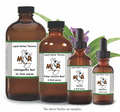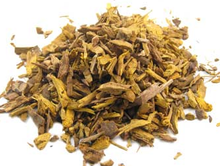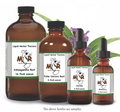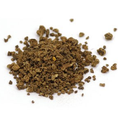Barberry Root Bark
Also Known As - Berberis vulgaris, European Barberry, trailing mahonia, berberis.
Certified Organic - Croatia
Overview - This plant is a perennial thorny shrub growing up to 12 feet high and native to central and southern Europe, northwest Africa and central Asia. The fruits are edible though have a very sharp taste and are sources of vitamin C. The fruits have been used historically to make jam. Many small birds eat the fruit and disperse the seeds in their droppings. There is a very popular Russian candy made from the fruit as well called; Barberis. The root contains the medicinal properties and has been used in several traditional systems in addition to the berries. The plant has been used in these systems for at least 2000 years.
Medicinal Uses - Berberine has a lot of uses. It can treat heart disease, immune disorders, digestive problems, eye infections, and other infections. It was to my amazement that berberine was effective in diabetes patients. Well, as soon as I found out my sister-in-law was a type-2 diabetic, I looked into it. I found several well-written scientific articles describing an effect of berberine that I could hardly believe. It seems that you can use it as a substitute for insulin.
Berberine is a phytochemical (plant chemical) found in many different plants. When used in herbal medicine, the usual sources are barberry, goldenseal, or Oregon grape. It's the main alkaloid of Coptis chinensis, which Asian folk medicine uses to treat diabetes. You also may hear people refer to Coptis chinensis as Chinese Goldthread, Huang-Lian, and Huang-LienIt.
One study, published just last year looked at the effect of berberine on how well muscle cells take in sugar. As you probably already know, except when we are actively exercising, sugar cannot get into muscle cells unless insulin is present to escort it in. That's why the blood sugar goes up when patients either don't have enough insulin, or when the insulin they do have doesn't work effectively, a condition called insulin resistance.
In the study, the researchers exposed muscle cells from rats to berberine, and then examined what happened. What they discovered was amazing.
The berberine solution had the same effect on the cells as insulin.
Just like insulin, it activated the same biochemical pathway (protein kinase phosphorylation activation of GLUT-4) that signals cells to take up more sugar. And just like insulin, the greater the amount of berberine they exposed the cells to, the more sugar they took up. All this happened in the absence of any insulin!
Better than metformin for diabetes
In another study they looked at the effect of berberine on 36 patients. All of them were newly diagnosed cases of type-2 diabetes.
Half of the patients took 500 mg, three times daily of the drug metformin (also known as Glucophage). The other half took berberine (berberine hydrochloride) in the same dose – 500 mg, three times a day. Then the researchers measured the participants' blood sugar levels for the next three months. Here's what happened: In terms of blood sugar control, both treatments worked equally as well. The fasting blood sugars went down 30%. And the sugar levels after eating (called the post prandial levels) went down even more – 45%.
But here's the really astounding thing about berberine. All of this happened within the first two to four weeks of taking the treatment. And unlike metformin, there were no side effects at all in any of the patients taking berberine. In addition to the sugar levels, the A1c levels went down as well – a full 20%. That may not sound like a lot. But it's a very significant improvement.
In addition to the remarkable effects it had on blood sugar control, berberine had another important effect that metformin did not have.
Triglycerides are the fats found in the bloodstream that the cells metabolize for energy. Since type-2 diabetics do not effectively burn fat (that's why they get fat), their triglyceride levels are always elevated.
In this study, those patients taking berberine had a reduction in their triglyceride levels of 21%. Those taking metformin had no reduction at all. This indicates that berberine not only improves sugar metabolism, it also improves fat metabolism. This might make berberine the most effective overall medication for diabetes that exists today, including pharmaceuticals. In fact, the authors of the study stated that berberine "can serve as a new class of anti-diabetic medication."
Parts Used - The whole root, aerial parts and sometimes the fruiting body.
Preparations - Barberry can be made into an herbal decoction: To prepare this decoction, place a teaspoonful of barberry bark in cup of cold water and boil the bark for ten to fifteen minutes. The solution can be cooled and then strained; it can be drunk thrice daily for treating a variety of disorders.
Barberry is also taken in the form of an herbal tincture: This tincture can be taken in doses of two to four ml thrice daily for different disorders.
Applications - Barberry may be made into an herbal decoction: To make the decoction, use one teaspoon of the powdered bark or the same amount of the fresh or dried root and boil this in a cup of water - 250 ml, this decoction can be used to gargle for the treating ulcers and a sore throat. Drink a cup of this decoction, a dose of about 250 ml, once before each meal to deal with stomach ulcers and in case of allergic diarrhea. The decoction can also be use in an herbal compress to treat bacterial eye infections. The ripe fruit of the barberry can be made into jams, tarts, compotes or jelly for the treatment of ultra-sensitive intestines. To treat biliary insufficiency, the tincture prepared in alcohol can be used with great effect; the same tincture is good for treating infections along the lower abdomen or cases of metrorrhagia. Doses of the tincture can be one teaspoon, three a day for a dosage regimen lasting ten days or longer.
Precautions - Adults should limit use of barberry to seven consecutive days at a time, waiting at least a week before using again. This gives the bacteria of the intestine a chance to recover. Taking vitamin B6 supplements can give infectious bacteria resistance to the antibacterial toxins in the herb.
- Barberry is often given to children with success, but should be used with caution, no more than three consecutive doses followed by a day without the herb.
- This herb is Not recommended while pregnant or nursing.
Disclaimer - These products are not intended to diagnose, treat cure or prevent any disease. Reviews are not intended as a substitute for appropriate medical care or the advice of a physician or another medical professional. Actual results may vary among users. Mountain Maus Remedies LLC makes no warranty or representation, expressed or implied, as to the accuracy or validity of the information contributed by outside product review submissions, and assumes no responsibility or liability regarding the use of such information. The information and statements regarding the dietary supplements have not been evaluated by the Food and Drug Administration. If you have a medical condition or disease, please talk to your health care provider. If you are currently taking a prescription medication, you should work with your health care provider before discontinuing any drug or altering any drug regimen, including augmenting your regimen with any herb or dietary supplements. Do not attempt to self-diagnose any disease or ailment based on the reviews and do not use the information contained herein for diagnosing or treating a health problem or disease. Proper medical care is critical to good health. If you have a health concern or suspect you have an undiagnosed sign or symptom, please consult a physician or health care practitioner.
References:
Jun Yina, Huili Xinga, and Jianping Yeb. "Efficacy of Berberine in Patients with Type 2 Diabetes"Metabolism. 2008 May; 57(5): 712-717.
Ma, X., T. Egawa, H. Kimura, K. Karaike, S. Masuda, N. Iwanaka, and T. Hayashi. "Berberine-induced activation of 5'-adenosine monophosphate-activated protein kinase and glucose transport in rat skeletal muscles." Metabolism, 2010 November;59(11):1619-27. Epub 2010 April 27.
 Loading... Please wait...
Loading... Please wait...















